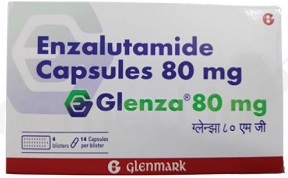Frequently Asked Questions About Prostate Cancer

Table of Contents
Enzalutamide Capsules for Prostate Cancer
What is Prostate Cancer?
The prostate is a small round-shaped gland located below the bladder in men that produces seminal fluid. Prostate cancer is a type of cancer in which the cancer cells develop in the tissues of the prostate gland. These cells tend to grow slowly but may spread to other body parts.
What are the causes of Prostate Cancer?
The exact cause of prostate cancer has not been known yet. However, some researchers have concluded that the growth of abnormal cells may occur due to changes in the DNA of cells, and as a result, the cells multiply rapidly and affect the growth of normal cells. These cells then accumulate in the nearby tissue and form cancer.
What are the major types of Prostate Cancer?
Adenocarcinoma is the most common type of prostate cancer that comprises more than 90% of men’s prostate cancer cases. Adenocarcinoma can be classified into two types-
- Acinar adenocarcinoma- This type of cancer develops in the prostate gland cells, and it holds 99% of cases of prostate cancer.
- Ductal adenocarcinoma- Cancer cells grow in the cells surrounding the prostate’s duct and spread faster than Acinar adenocarcinoma.
The other types of prostate cancer include-
- Transitional cell carcinoma- In this type of prostate cancer, the cells start growing in the tissue that carries urine to the urethra.
- Squamous cell carcinoma- In this type of cancer, the flat cells that cover the prostate grow cancerous and then spread to all prostate tissues.
- Small cell prostate cancer– This rare cancer tends to develop more rapidly than all kinds of prostate cancer.
What are the risks factors for Prostate Cancer?
Although there is no definite reason for the growth of cancer cells in the prostate, some factors may expose you to the risks of getting prostate cancer, such as-
Age- The risk of prostate cancer is higher in men above 60.
Family history- If a biological family member has been diagnosed with prostate cancer in the past, the chances of getting prostate cancer become higher.
Changes in genes- Inherited mutation of the BRCA genes can increase the possibility of prostate cancer in men.
What are the most common symptoms?
Normally, prostate cancer does not show symptoms, especially early. Symptoms of prostate cancer are similar to the symptoms of enlarged prostate and may appear in the final stages, which may include-
- Frequent urinating
- Painful urination
- Blood in urine
- Loss of appetite
- Pelvic pain
- Irregularities in bowel habit
Does Prostate Cancer affect sexual health?
Prostate cancer can reduce the frequency of sexual intercourse. In some cases, it can cause erectile dysfunction during post-treatment especially, men who undergo prostate cancer surgery are more likely to see a negative impact on their sexual health.
How is the screening for Prostate Cancer done?
A certain type of screening is done to find out the presence of cancer before seeing the warning signs. For example, the prostate-specific antigen blood test is a common screening test that detects prostate cancer. The test measures the amount of PSA (Prostate-specific antigen), a protein produced by cancerous cells in the blood. However, the result of a blood test is not 100% reliable; in such cases, you may be advised to do a prostate biopsy.
Is Prostate Cancer Curable?
While prostate cancer is expected to be curable in the initial stages, stage 4 is very serious and cannot be cured. However, early diagnosis and treatment may help to reduce health complications. In most cases, a doctor may advise you on either surgery or chemotherapy. In addition, certain strong medications like Enzalutamide capsules are also used to treat metastatic prostate cancer.
Is Enzalutamide capsules effective against Prostate Cancer?
Enzalutamide capsules belongs to the group of medicine called Androgen receptor inhibitors. The dose of 80 mg of Enzalutamide is considered the most effective for treating Castrate-resistant prostate cancer (CRPC). Enzalutamide capsules(Glenza 80 mg) and glenza 40 mg contain Enzalutamide capsules and are prescribed to patients with prostate cancer after surgery or hormonal therapy.


 Anti Cancer Drugs
Anti Cancer Drugs Hepatitis C
Hepatitis C Meds for HIV
Meds for HIV Ayurvedic Medicine
Ayurvedic Medicine Transplant Medicine
Transplant Medicine Respiratory System
Respiratory System +91-9999064250 / 9811604424 / 9811604444
+91-9999064250 / 9811604424 / 9811604444
 8(800)100-47-90
8(800)100-47-90












